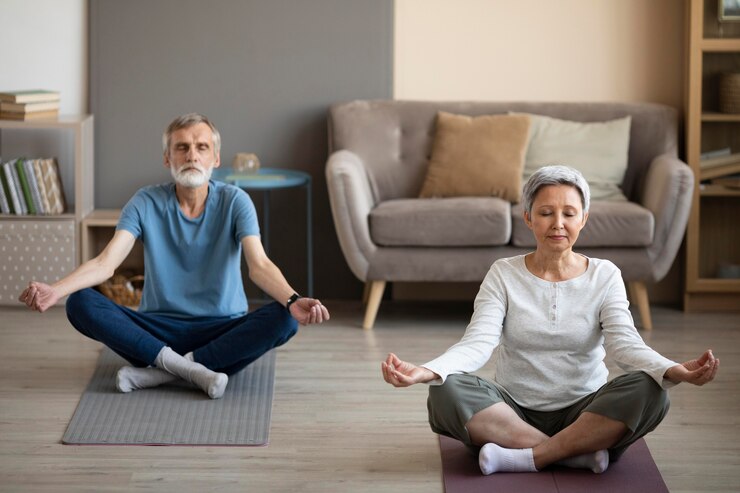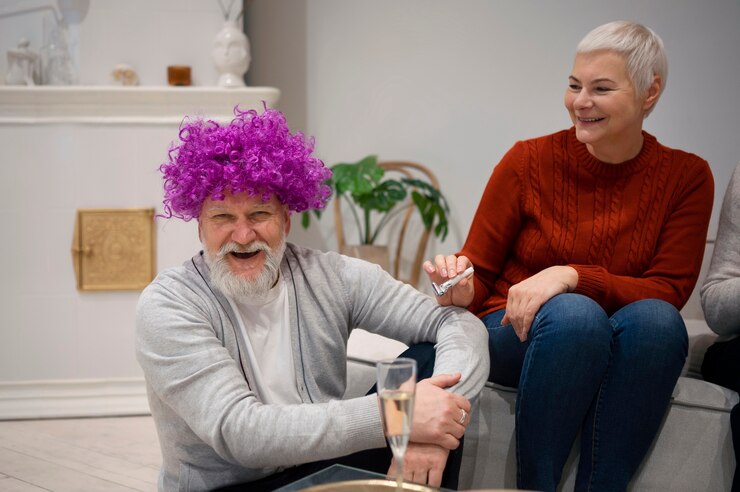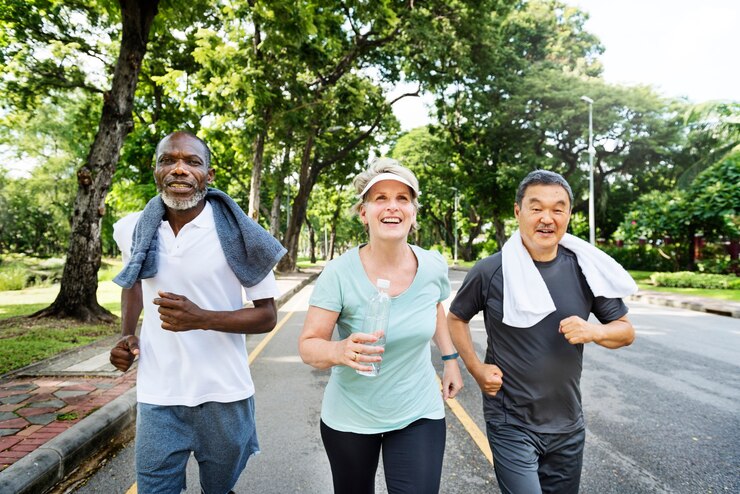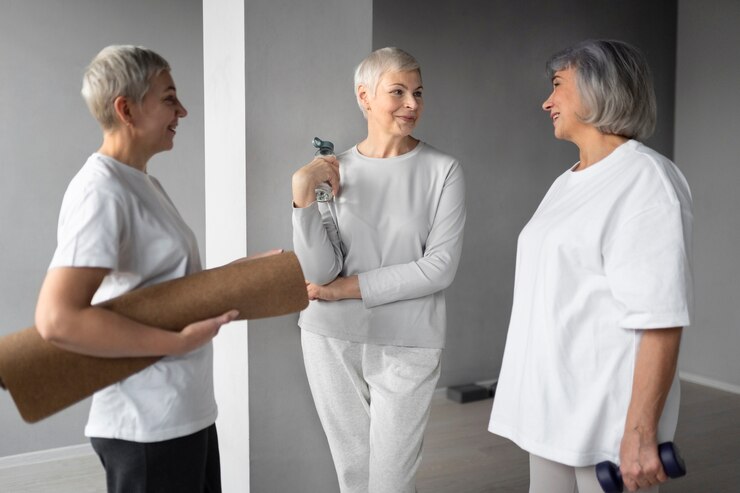Mind Over Matter: Innovative Mental Health Practices for Seniors

As we age, mental health becomes just as important as physical health. Seniors often face unique mental health challenges, from memory loss and cognitive decline to feelings of loneliness or anxiety. Maintaining mental well-being is essential for living a vibrant and fulfilling life during the golden years. This post explores innovative mental health practices that can help seniors nurture their minds and foster emotional well-being.
The Unique Mental Health Challenges Seniors Face

As we grow older, our mental health needs change. Seniors often experience challenges that can impact their emotional and cognitive well-being. Understanding these challenges is the first step toward addressing them.
a. Cognitive Decline and Memory Loss
Aging naturally affects cognitive functions like memory, attention, and problem-solving. Conditions like dementia and Alzheimer’s disease become more common with age, affecting seniors’ ability to recall information or manage daily tasks.
b. Loneliness and Social Isolation
Retirement, losing loved ones, and shrinking social circles can lead to feelings of loneliness and isolation. Many seniors struggle with a sense of purpose, which can lead to depression and a decline in mental health.
c. Anxiety and Depression
Changes in physical health, financial concerns, and the emotional burden of aging can cause anxiety and depression. Seniors are particularly vulnerable to these issues as they navigate the many transitions that come with aging.
The Importance of Mental Health Practices in Senior Years

Maintaining mental health is crucial for seniors to enjoy their later years with vitality and peace of mind. Here’s why these practices are essential:
a. Maintaining Cognitive Function
Engaging in regular mental exercises and innovative practices helps keep the brain sharp. Whether learning new skills or practicing brain-stimulating activities, keeping the mind active can prevent or slow cognitive decline.
b. Emotional Well-being
Mental health practices that focus on mindfulness, therapy, and social engagement help reduce stress, anxiety, and depression. These practices foster a positive outlook and a sense of emotional resilience.
c. Enhancing Overall Quality of Life
Focusing on mental well-being can improve physical health, enhance relationships, and promote a greater sense of purpose. When mental health is prioritized, seniors are better equipped to enjoy a fulfilling and joyful life.
Innovative Mental Health Practices for Seniors

Seniors can adopt several innovative strategies to maintain and improve mental health. These practices go beyond traditional methods and offer creative, engaging ways to enhance cognitive and emotional well-being.
a. Mindfulness and Meditation
Mindfulness is a powerful tool for reducing stress and improving focus. Through simple mindfulness practices, seniors can learn to live in the moment, helping them feel more relaxed and less anxious. Meditation can also promote emotional balance and improve sleep quality, making it an excellent mental health practice for seniors. Simple exercises like deep breathing or guided meditation sessions can greatly affect how seniors cope with stress.
b. Cognitive Behavioral Therapy (CBT)
CBT is an effective therapeutic approach for helping seniors address anxiety, depression, and negative thinking patterns. It involves identifying and challenging harmful thought processes and replacing them with healthier, more positive ones. Seniors can access CBT through in-person therapy or online platforms, which offer greater flexibility.
c. Art and Music Therapy
Engaging in creative activities like painting, drawing, or playing music can have a profound effect on mental health. Art and music therapy particularly benefit seniors, as they stimulate emotional expression and cognitive function. Studies have shown that music can evoke memories, reduce anxiety, and improve mood, especially in seniors with Alzheimer’s or dementia.
d. Brain Games and Mental Exercises
To maintain cognitive sharpness, seniors can engage in brain games like puzzles, crossword puzzles, or Sudoku. Additionally, digital tools like brain-training apps provide fun, interactive ways to improve memory and cognitive skills. These exercises challenge the brain, keeping it agile and preventing memory loss.
e. Emotional Journaling
Journaling is a simple yet powerful way to manage emotions. Writing down thoughts and feelings helps seniors process their emotions, reflect on their experiences, and release stress. Daily journaling also helps track emotional well-being and allows seniors to identify emerging mental health issues.
The Role of Social Connection in Mental Health

Humans are social creatures, and maintaining meaningful relationships is critical to mental health. For seniors, staying connected with others helps combat feelings of loneliness and improves emotional well-being.
a. Building and Maintaining Relationships
Connecting with family, friends, and loved ones is essential for mental wellness. Seniors who engage in regular social interactions report feeling more emotionally supported and less isolated. Whether through regular phone calls, visits, or activities, maintaining relationships provides emotional nourishment.
b. Joining Senior Clubs and Groups
Local senior centers, clubs, and interest groups provide valuable opportunities for social interaction. Group activities such as book clubs, fitness classes, or hobby groups encourage seniors to form new friendships and maintain active social lives.
c. Using Technology to Stay Connected
Advancements in technology have made it easier for seniors to stay connected with friends and family, even from a distance. Video calls, social media, and online communities provide platforms for seniors to interact, share experiences, and keep in touch with their loved ones, reducing feelings of isolation.
Physical Health’s Impact on Mental Wellness

Physical health and mental health are closely intertwined. A strong body supports a healthy mind; regular physical activity can significantly improve mental well-being.
a. The Mind-Body Connection
Regular physical exercise reduces symptoms of depression, anxiety, and cognitive decline. Activities combining movement and mindfulness, such as yoga and Tai Chi, promote physical fitness and mental clarity. Engaging in these practices helps seniors manage stress, improve mood, and support brain function.
b. Exercises that Support Mental Health
Low-impact exercises like walking, swimming, and yoga are excellent options for seniors. These activities boost endorphin levels, improving mood and reducing stress. In addition, engaging in group exercise classes can provide the added benefit of social interaction, further promoting mental wellness.
Leveraging Professional Support for Mental Health

In addition to self-care practices, seniors can benefit from professional mental health support. Seeking help from professionals ensures that seniors get the right guidance and interventions for their mental health needs.
a. Therapy and Counseling
Therapy offers seniors a safe space to work through emotions, grief, or transitions that may affect their mental well-being. Licensed therapists, whether in-person or online, can help seniors develop coping strategies and address mental health concerns.
b. Support Groups
Support groups connect seniors who are facing similar challenges, such as grief, chronic illness, or loneliness. These groups foster community and shared understanding, providing emotional support and practical advice. Local and online support groups allow seniors to connect with peers and feel less isolated.
c. Telemedicine for Mental Health
With the rise of telemedicine, seniors can now access mental health professionals from the comfort of their homes. Teletherapy provides flexibility and convenience, making it easier for seniors to seek help without traveling. This innovation has become increasingly popular, especially for those with mobility issues.
Tips for Creating a Mental Health Routine

Developing a consistent mental health routine can significantly improve emotional and cognitive well-being. Here’s how seniors can create a routine that supports long-term mental health:
a. Set Aside Time Daily for Mental Health Practices
Incorporating mental health practices like mindfulness, journaling, or meditation into a daily routine ensures that mental wellness is a priority. Even just 10 to 15 minutes a day can make a meaningful impact on mental health.
b. Monitor Mental Health
Seniors should regularly assess their mood and emotional well-being. By keeping track of how they feel each day, they can recognize early signs of stress, anxiety, or depression and seek help if needed.
c. Make it Enjoyable
Mental health practices should be fulfilling and enjoyable. Whether it’s spending time in nature, journaling, or engaging in creative activities, the routine should include practices that bring joy and relaxation.
Conclusion

Mental health is a vital aspect of overall well-being, especially for seniors navigating the challenges of aging. Seniors can enhance their emotional and cognitive health by adopting innovative practices like mindfulness, art therapy, and social connection. These practices, combined with professional support when needed, provide a foundation for seniors to live their golden years with joy, purpose, and mental clarity.
Seniors, it’s never too late to prioritize your mental health. Start incorporating these practices today and enjoy a healthier, more fulfilling life.





